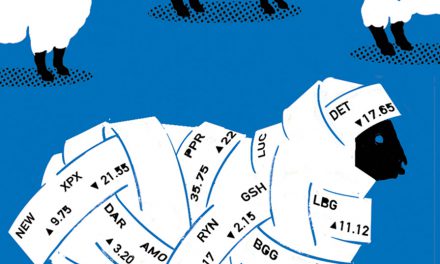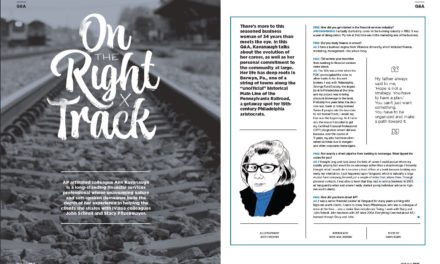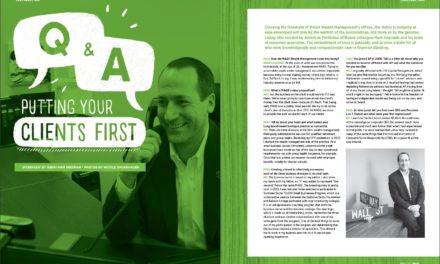
FREE 6.3 Feature – Jane Desmond
As the first woman in her home to graduate from a four-year American college, Desmond entered the workplace a shy young woman, but one determined to earn a fair living in what was, and still is, a male-dominated industry. Her resolve found her as the first female Rookie of the Year in the 50-year history of First Investors Corporation.
To view the full article please register below:
FREE 6.3 Feature – Jane Desmond
Gentleman and Jane.
Jane Desmond is a second-generation American. Her mother, while born in New York, was raised in Rome and although educated, in her early years did not speak English. Her father owned a retail store, and provided for his family as a food importer. As the first woman in her home to graduate from a four-year American college, Desmond entered the workplace a shy young woman, but one determined to earn a fair living in what was, and still is, a male-dominated industry. Her resolve found her as the first female Rookie of the Year in the 50-year history of First Investors Corporation. Throughout the years, she rose to the top of her peers as a manager and producing advisor. Today, she is ranked amongst AP’s Top 50 producers and Top 10 managers, overseeing affiliated representatives in various offices across the nation. Her home base sits north of Grand Central Terminal; her ninth-story office window overlooks a bustling city below.
“This is my 30th anniversary in financial services,” Desmond remembers proudly. “In 1982, I answered an ad from First Investors in the New York Times. I will tell you, my father was very disappointed when he found out I was taking a job on commission!”
At the time, Desmond was in her twenties; a young, smart woman, eager to make it on her own. Her first few weeks at the firm found her calling every person she knew in hopes to establish a client base or, at the very least, get some solid referrals. To her surprise, people were receptive to the services she was offering. Those who couldn’t invest offered names of people who would, and she quickly established a thriving book of business. Her approach was simple—just speak to people in “plain vanilla”; no gimmicks, no rehearsed lines. She instinctively knew prospects would see through the rehtoric.
“When I spoke to them, I spoke from the heart,” she offers genuinely. “I was open to their needs and concerns, and addressed them in a very honest way.”
While anxious to do well, Desmond knew the value of honesty; cutting corners to make a quick buck was not an option. Her main objective was to provide solid, sound advice that was always in the best interests of her clients. Those good instincts paid off, and at the first convention of her professional career she was called on stage to accept the award for Rookie of the Year. She was the first female to receive the honor in the 50-year history of the company.
“I remember there were over one thousand financial advisors in the room, and they gave me a standing ovation when I went up on stage to accept my award. I was absolutely terrified!”
Desmond’s success gave her the confidence to try her hand at managing, and in 1983, one short year after earning her series 7 license, she requested permission to open an office in Astoria, Queens; the town she and her family was raised in. She remembers being met with reservation. “There were definitely some critics, those convinced I was not going to do well. They would intentionally speak loud so I could hear them – ‘she can sell, but let’s see if she can manage’—I just went full force,” she remembers.
As a woman working in a man-heavy industry, it can be difficult to differentiate between skepticism and sexism. One can be left to wonder if a lack of confidence from peers or upper level management has more to do with sex than a true ability to complete a task; add in the fact that, for many women confidence and mettle can be a double edged sword. Desmond discovered this early on.
“You have a choice. You’re either going to be called a bitch, someone with a problem or a pushover. I’d rather take the former. When I started out, much younger, much thinner, I used to get snide remarks like, ‘what’s a pretty girl like you doing in a business like this?’ As you get older, you learn to dismiss it and move on.”
Desmond can still remember walking into meetings and being the only woman in an entire conference room of men. “I remember one branch manager used to start the meetings by calling everyone to attention; he would say, ‘Gentleman and Jane, the meeting is starting!’” She laughs and shakes her head. “I’m still shocked that 30 years later, even at AP, women make up only 10 percent of the meetings. I just got back from the AP Leader’s Conference; it was wonderful, well run, a great time, great bonding, but of the 10 managing directors, I was the only female. Of the 20 top producers at AP, only two are women. If my numbers are correct, I think we have approximately 800 total producers and approximately 80 of them are women; 10 percent! I find that to be so shocking.”
Even though being a female presented its challenges, Desmond disregarded it all and hit the pavement hard in those early days. She recruited heavily for her Astoria office and, one-by-one, brought on advisors from all walks of life. She encouraged them to approach prospects in the same manner that earned her Rookie of the Year; advice in plain vanilla. Any doubt of Desmond’s ability as a manager was quickly quelled, and by 1989 she was a regional manager in charge of four offices, training those under her to be supervisors in individual offices within her branch.
All was going well for Desmond and her team, until one fated Friday in October when a news story reported the breakdown of a buyout deal for United Airlines Corporation. In a few short moments, everything started to spiral and before the end of the day, the Dow Jones was down 6.91 percent, NASDAQ 3.09 percent, and the S&P 500 6.12 percent. The events sparked a collapse of the junk bond market, sending the financial services industry into a tailspin. Many of Desmond’s recruits couldn’t take the heat and, in the frenzied uncertainty, left the brokerage business entirely. It was then when Desmond realized what she refers to as “the insecurity of management.”
In 1990, she made the decision to switch gears. She left First Investors for another broker/dealer and went full force back into personal production, no longer managing fellow colleagues. In typical style, it wasn’t long before Desmond was the top producer at her new, regional Lon T. Dolber, who, at the time, was recruiting to build his own independent broker/dealer.
“I met with Lon and he convinced me that I’d do better if I was independent. He’s such a great salesman,” she recalls with a laugh. “I said, ’okay.’ But, I told him, ’Lon, I barely know how to turn on my computer!’ He told me not to worry because his brother, [APH CTO]Rob Dolber, could help me with any technical issues. Those were the days when Rob made house calls! Rob showed my assistant how to import everything to a program he and Lon designed called FilePro. Over the years I slowly overcame my lack of knowledge about technology; I forced myself to learn.”
Fast forward to present day—Desmond is still in personal production and is back managing full time. While there are some who believe it’s impossible to do both, Desmond adamantly believes otherwise. “I’ve always been one who can juggle many things. Someone who’s only in production can’t imagine going into management. I can appreciate that because that’s what they are used to. However, I was a producing manager 30 years ago and still am today. I know how to balance my time. I think I can be a more effective manager as someone who is producing because I understand their frustrations, their needs and the demand to put business through as quickly as possible.”
Desmond’s confidence is infectious. As it pertains to the business, it doesn’t seem there is anything she is afraid to tackle. This includes the transition from transactional to advisory business.
In 2011, she purchased a book of approximately one hundred advisory accounts from a fellow colleague who, in a mid-life career change, was getting out of the business entirely. Buying the book and servicing the new advisory accounts forced her to do business differently. When asked about the change, Desmond chalks the experience up to one big learning process. “By the sheer number and size of accounts alone, I couldn’t handhold and manage them the way I used to. I still meet and review by phone or in person every three months, but all in all, this was a very different way of doing business for me. It was a big undertaking, but I’m very glad I did it.”
Desmond’s clients have responded well to the transition. Initially, however, they all had one central question—What was Jane going to do for them now that she wasn’t doing for them before? The answer she gave was, per usual, honest and in plain vanilla.
“I just had to explain that this was in their best interest: complete transparency, full disclosure, and the ability to rebalance them as often as I wanted without any conflict or question. The truth is, what I was doing was in their best interest, more than in my best interest. When I broke it down to them that way, they were very comfortable; and they are still comfortable. I have never had any complaints with clients in advisory, even with the market down. It’s worked beautifully.”
Desmond steers away from advisory for anyone under $250,000, her feeling being there isn’t enough in the account to rebalance; and, while some of her colleagues choose to use money managers, Desmond picks the placements herself. “I have a list of plain stocks, boring stocks that I follow; the dividend aristocrats that have a track record of consistently raising their dividends. What I have found is through all this volatility in the market, these are the stocks that hold up best because people are not selling names. They know Coca Cola, McDonald’s, Kimberly Clark, Clorox (1) and they’re not as afraid to hold on to them, as opposed to some mutual funds they’re not familiar with. Of course, I balance these with some short duration bonds and other funds that I’m comfortable with. Each client has a different mix, but all-in-all I have pretty much stayed with the same select group of stocks and funds that I know and follow. I don’t try to razzle-dazzle clients with any unusual ideas or great finds that nobody else has. That’s not me.”
Desmond services approximately 100 households and 250 advisory accounts on top of managing 12 APFS advisors. Thus, her day is split into two shifts: daytime is for production, and evening for managing. “I’m not focusing on supervision during the day unless something comes up that needs to be attended to. Otherwise, comments come after hours. I recently got an e-mail from one of my top guys telling me I needed to get a life because I commented on something Friday night at 8 p.m.! The truth is I’m bored to death with what’s on television, so I’d rather be at the computer working. This is my life.”
A fair bet would be that Desmond loves the work she does. She’s often out to dinner with her clients, hosting brunches with them at her East Hampton summer home and traveling with them to places as far away as Thailand and India. Desmond happily crosses the line from trusted advisor to cherished friend. “Over the years, we no longer discuss just business matters, but personal ones as well—health issues new births, divorce, change in careers, retirement, travel, children … I truly enjoy my clients; they are good people. You know, I have stayed with the same physician for over 20 years. When I look back and ask why, it’s because he sits and talks to me and acts with compassion. He calls back with my reports, either good or bad, as opposed to just saying, ‘if there’s a problem, I’ll call you.’ That personal touch, showing he cares, is why I have stayed.”
After a moment of pause, she sums it up perfectly. “I’d like to think the success I’ve found is because I do the same.” She smiles. “When I look back after 30 years, it’s really a testament to the American Dream that a young girl who was basically a quiet, shy person who never saw herself doing well in sales, could excel and do so well in an industry that’s tough on women. To take someone like me who had no experience, no background in the business and give them an opportunity to be successful—that’s truly the American Dream.” We couldn’t agree more. Happy anniversary, Jane Desmond.












